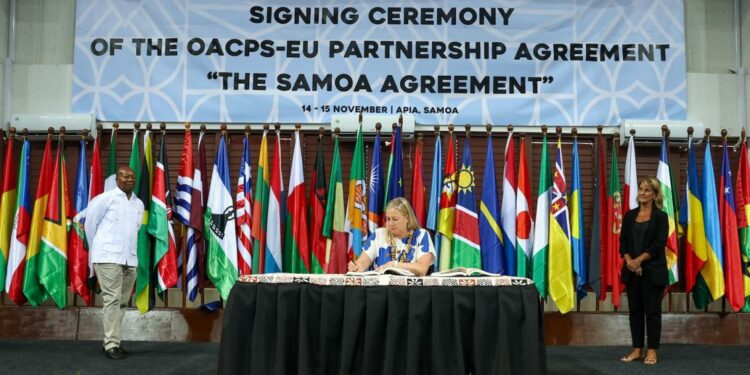The House of Representatives may have embarked on a misinformation campaign regarding the outcome of the debate on the Samoa Agreement. The lower cham
The House of Representatives may have embarked on a misinformation campaign regarding the outcome of the debate on the Samoa Agreement. The lower chamber of the National Assembly discussed the Agreement on Tuesday following the alleged inclusion of the Lesbian, Gay, Bisexual, Transexual, Queer, LGBT+ clause in the document.
The Samoa Agreement is the legal framework for the European Union’s relations with 79 countries, including 48 African, 16 Caribbean, and 15 Pacific countries.
The House resolved that the executive should suspend the implementation of the Agreement and directed its committees to investigate the alleged controversial and grey areas. That resolution followed a motion jointly moved by Aliyu Madaki (NNPP, Kano) and 88 others on Tuesday.
However, hours after the resolution, the House, through its spokesperson, Akin Rotimi (APC, Ekiti), issued a statement, saying the House did not call for the suspension of the implementation of the Agreement. In the statement, Rotimi claimed that the media erroneously reported the outcome of the debate on the Samoa Agreement.
“It is important to clarify that the House of Representatives did not resolve to call for the suspension of the Agreement nor the suspension of its implementation, as has been erroneously reported by some media houses. Instead, the House resolved to thoroughly scrutinise the Samoa Partnership Agreement for all contentious clauses through legislative hearings,” the statement reads in part.
However, this is a blatant misinformation campaign by the House because lawmakers indeed adopted a prayer urging the government to suspend the Agreement.
“Call on the federal government to suspend the implementation of the Samoa Agreement until all controversial clauses are clearly defined to ensure they do not violate any law in Nigeria,” Madaki had prayed in his motion.
After a long and heated debate during which some lawmakers even called for the withdrawal of the Agreement, the House adopted the three resolutions on the motion without any amendments.
No amendment was moved by any of the lawmakers on the floor of the House. Some lawmakers even shouted ‘amendment!’ when the presiding officer, Deputy Speaker Ben Kalu, put the motion to a voice vote, but he ignored the call.
“There was no amendment,” Kalu responded as he ruled on the decision.
Therefore, it is surprising that Rotimi is claiming that the media ‘erroneously’ reported the suspension part when the House asked the federal government to suspend the implementation of the Agreement.
Strangely enough, the plenary proceedings produced by the Office of the Speaker presented a record of events that contradict Rotimi’s statement. In the proceedings released, the Speaker’s office claimed that the House ruled that the federal government should completely withdraw from the Agreement.
According to the document, a member, Ghali Mustapha, moved for an amendment.
“Ghali Mustapha proposed an amendment calling on the federal government to withdraw from the Samoa Agreement and reject it in totality. The motion was voted on and adopted as amended,” the proceedings read in part.
However, this is equally false. Mustapha did not move an amendment; he only contributed. The presiding officer even asked if that was an amendment, and he answered no. In addition, procedurally, amendments must be seconded and put into question.
The resolution of the House can only be changed through a proper motion of rescission moved on the floor.
If the House is unsatisfied with its resolution or the lawmakers feel that they have erred in procedure, they should move a motion to review their previous resolution.
The lower chamber has rescinded decisions in the past. For instance, in February, the House resolved to investigate the use of funds from the Federal Account Allocation Committee (FAAC) by states and LGAs in 2023.
When the House realised that it lacked such power, the Chairman of its Committee on Rules and Business, Francis Waive, moved a motion urging the House to rescind its decision. The motion was adopted.
Instead of the House going through the rescission process, it is going through the route of misinformation.
The leadership of the House may be worried about the potential outcome of recommitting the motion to rescission. Some members opposed to the Agreement may see it as an attempt to undermine their stance, which they have communicated through the voice vote.
The controversy over the Agreement stemmed from a media report which claimed it contained some clauses on the protection of the rights of LGBTQ+ individuals.
The Nigerian government equally countered the claim, stating that Nigeria has existing legislation against same-sex relationships.
Aside from the government, the Nigerian Bar Association (NBA) debunked the ‘LGBTQ+ clause.’ In a statement, its President, Yakubu Maikyau, said the association had the privilege of reviewing the Agreement before the Nigerian government signed it.
Maikyau said there is no provision in the Samoa Agreement requiring Nigeria to accept or recognise LGBT rights.
Despite all this, the House allowed a motion premised on a report that the author admitted had lapses, and even several lawmakers ignorantly debated the motion with the same false narrative without referencing the copy of the Agreement.
When the Majority Leader, Julius Ihonvbere, tried to educate his colleagues on the Agreement, he was shouted down by his colleagues.
Professor Ihonvbere even challenged his colleagues to provide a specific portion of the Agreement that discusses LGBTQ+.
“I think the public has been misled on this. Let me state that there is no portion of the Agreement that is on LGBTQ+. If you have it, bring it here. In fact, three ministers have come out, including the Minister of Information and Budget and Planning, to say that there is nothing like that in the Agreement and that it was never mentioned. It was never mentioned, and there is nothing like lesbian rights in the Agreement. If you have the Agreement, bring it out here. There is nothing like that,” he said.
